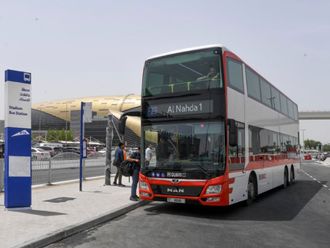Abu Dhabi: Identity cards will soon carry advanced biometric identification such as iris images to ensure foolproof identity of the individual.
"Although now the fingerprint is compulsory to get an identity card for an individual above 15 years of age, sometimes it is difficult to take fingerprints of labourers as their hands get rough due to hard work," Darwish Al Zarouni, Director-General of Emirates Identity Authority (EIDA), told Gulf News.
"To overcome that problem we have implemented facial recognition technology, which requires high quality photographs that can be identified by the system even after a long time," said Al Zarouni.
But fingerprints and facial recognition have certain limitations.
"The distortions due to accidents or deliberate attempts may create loopholes in the system."
He said the latest iris scan technology overcomes those shortcomings.
Al Zarouni said the Citizens ID Forum held in Abu Dhabi was helpful in raising awareness on identity cards. He said EIDA will adopt mobile technology which will enable road, transport and shipment sectors to utilise the EIDA system to identify people.
"When the mobile technology is implemented officials like police can verify the identity of a person even in an ambulance by giving biometric inputs to the mobile card reader which will be connected to our system," said Thamer Rashed M. Al Qasimi, Planning Division Manager at EIDA.
"Almost all government offices will have identity card readers as they will be linked to EIDA soon," said Al Qasimi.
The upgrade of the identity card is a part of e-governance. A digital signature without username and password will be a reality when the system is implemented, said Ali Al Khouri, Director of the strategic planning office at EIDA.
Scanning has become faster as the machine can read the subject more than 2.5 metres away whereas conventional machines read up to 18 inches.
"An iris gives you the over 200 measurable aspects whereas fingerprint gives just 50 to 70," said David. B. Johnston, Vice-President, Market Development of Aoptics.
Short range scanning with significant subject participation has become a thing of the past so that travellers at the airport can complete scanning quickly, he said.
The iris is the only organ which does not change from age 1 to age 90 so it is suitable for a permanent health record. "But is not useful for criminal investigation as you can neither trace it like fingerprints nor scan the iris of the dead."
Police can also control illegal residents with the help of new biometric identity cards, said a senior police official.
"Some illegal residents destroy their documents and when caught by authorities they claim they lost the documents to get concessions from the authorities," said Brigadier Ahmad Naser Al Raisi, Director General at General Directorate of Central operations of Abu Dhabi Police.
He spoke to Gulf News on the sidelines of the Citizen ID Forum held in Abu Dhabi.
Forgery: Passports seized
The Interior Ministry seized 500 forged passports at Dubai International Airport in the second half of last year.
Brigadier Mohammad Ahmad Al Merri, Director General of Dubai Naturalisation and Residency Department (DNRD), said iris scanning helped catch 2,611 people who attempted to enter the country after being banned from entering the country.
He said DNRD uses technological advances in setting up iris scans and detecting sophisticated fake passports. He said the number of fake passports sized in the first half of 2007 is 299 and the number of detainees at the airport who failed the iris scan is 1,015.
Staff Report











